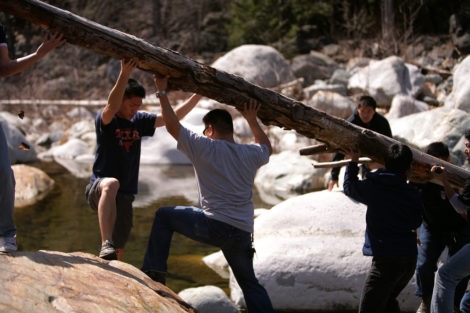You and I are called to be personally engaged in making disciples of Jesus Christ.
Actually, this is one thing all of us should be doing if we claim to follow Jesus. If you’re a church leader, this is especially important. You can’t expect the community you lead to do something you’re not willing to do yourself.
(By the way, if you struggle with this assumption, you may want to start by reading THIS post from a few weeks ago.)
To keep things simple, I’ll work with this definition of a disciple: A disciple is someone who spends time with Jesus, learning from Jesus how to become more like Jesus in character (who he is) and competency (what he does). At some point during this process, a disciple will confess Jesus as Lord.
An easy way to figure if you’re currently engaged in disciple-making is to ask yourself a simple question: “Who are my disciples? Who is being led to spend time with Jesus, learning from Jesus how to become more like Jesus, because of their relationship with me?” This is the same question the Holy Spirit asked me several years ago. If, like me, you can’t think of someone who fits that description, there is work to do!
The truth is that for those of us in full-time ministry, it’s tempting to think that our work equals making disciples. We think of things like preaching, teaching and leading our churches as our parts in the process. And that’s true! But there’s no legitimate substitute for developing friendships outside of church circles, investing in those relationships, sharing our faith, and walking alongside people as they discover a transforming relationship with Jesus.
It’s much less comfortable, and it challenges our sense of adequacy because it forces us to reflect on and adjust the ways we deal with our families, money, time, or any other aspect of our lives. Developing discipleship relationships exposes us for who we truly are.
I want to share three simple elements that helped me make sense of disciple-making as something personal: a people; a place; and a plan.
A People
Disciple-making involves people. What we often fail to realize is that it usually involves a particular people. In the Bible, God chose a particular people to reveal God’s grace and purpose for the whole world. This choice had nothing to do with how good the Israelites were. It had everything to do with a God who refuses to be generic in approach.
Jesus didn’t just parachute into a Jewish community. He was born into and shared a history and a culture with a people. This is what being incarnational means. I’m always in awe of the lengths to which God was willing to go to act out his reconciling, redeeming love for us all.
We can’t stop at this sense of awe, though. Jesus invites us to imitate him in our approach, to become missionaries.
But how do we go about this today? Here are a few simple questions to get us started:
Who do I relate to naturally outside of church?
You might have a tribe outside of church relationships already. They may be your neighbors, coworkers, teammates, hobbyists, or staff at the local coffee shop. If you relate to people in at least one of these circles, start there.
If you don’t, then it’s time to set aside at least one day a week to get outside of “churchtown.” Find a hobby, meet a neighbor, or work from a coffee shop. It doesn’t take much to find people disengaged from church or faith.
I moved with my family to Richmond, Virginia two years ago. We spent our first three months looking for the right home for us. We had a wish list for our house, but we also wished for the right people. We prayed for a community where we could develop friendships that lead to discipleship. God came through, and just a year and a half later, our most significant relationships are with our neighbors. We have hosted and have been invited to parties, we’ve gone out with friends, and we’ve gotten to know the stories of people in our community. In the process, we’ve come to love our neighborhood.
God is calling you to love a people. Start by spending some time praying for that people. Pray for God to prepare encounters, conversations, and opportunities to learn and share.
Who are the “persons of peace” in my community?
I was introduced to the idea of “person of peace” by Jo Saxton and Mike Breen (You can find them here and here). “Persons of peace” are people you encounter who a) welcome you; b) receive you; c) are open to you; d) are curious about your life because of Jesus; e) serve you. You will find examples in Luke 9 when Jesus sends out his disciples, or in Acts with Peter and Cornelius, Paul and Lydia, and Phillip and the Ethiopian eunuch.
“Persons of peace” are community insiders who open doors for you simply by becoming your friends. Because of God’s prevenient grace, we should simply assume that God was at work in people’s lives before we ever show up. “Persons of peace” are one of God’s ways of reminding us of this. They are ready to receive even before you arrive. Since many of us haven’t lived in our communities for very long, finding “persons of peace” is essential.
Fourteen years ago, my mom discovered an illegal housing settlement just outside her church’s neighborhood. This is common in many Brazilian city suburbs. People come seeking opportunities, and end up in slums – often illegal land settlements – when they are unable to find decent jobs. She decided to reach out to that community only to discover they had been exploited by pastors who preached a prosperity gospel and were all too eager to receive their tithes and offerings.
Then she met Mr. Dirceu, a local community leader who was a “person of peace.” People feared Mr. Dirceu but they also respected him. He welcomed her, introduced her to people, and vouched for her. For four years, all my mom did was visit people, hear their stories, pray for those who were sick, and share her faith.
We eventually planted a church in that neighborhood. Today she is trusted and beloved by that community. In an area where police raids, killings, and drug-related violence are all too common, she is protected like one of their own. This would have never been possible without Mr. Dirceu.
Who has God prepared ahead of time to welcome you? Could it be that friendly neighbor who knows everyone? The loud barista at your local Starbucks who’s always striking up conversation? Could it be your boss, your gym instructor, the super-involved parent at the local PTA?
Do you have someone who comes to mind? Spend some time in prayer and ask God to lead you to persons he’s prepared in advance for you.
Stay tuned for the next piece of this two-part series where we will look at a place and a plan.


